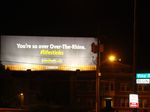TidyCat Apologizes For Comparing Town to Used Cat Litter
This guest post was written by Kevin Dugan, a full-time marketer, a long-time blogger and a proud Cincinnatian.
Some of you have probably seen TidyCats #lifestinks campaign. It's online with a campaign site encouraging consumers to Tweet about why life stinks and with videos designed to go, uh, feral perhaps. It's offline too with TV spots, out of home ads - even a mobile tour.
It's all designed to make sure we understand that TidyCats covers up the smell of used cat litter. Who knew?
When Funny's Too Broadly Defined
One of the ads created its own stink. TidyCats uses wordplay in a Cincinnati-based billboard to localize the campaign. But in doing so, the brand mocks Over-The-Rhine (OTR), a downtown Cincinnati neighborhood where the offending billboard is perched. Wikipedia will tell you OTR has been compared to more well-known neighborhoods like Greenwich Village and the French Quarter. And while it's had some challenges, it's experiencing a major revival.
Disclosure: I live in Cincinnati. And you can probably guess I love the city, but I have no love for the TidyCats billboard. I learned about this bad ad on Good Friday evening. More than a few comments reacting to the ad were shared across Facebook, Twitter and TidyCats campaign site the next day.
TidyCats Quick Action Calls Off the Dogs of War
To TidyCats credit, the brand was online and listening. And in less than 19 hours after I saw the billboard, TidyCats acknowledged the issue and shared this note with anyone trying to stir up a cat fight - on a holiday weekend no less.
"We appreciate your comments, Kevin. Our billboard mentioning OTR was meant to be humorous. We understand that to many of you, it wasn't. We will be taking fast action to correct our error. Please accept our apologies. - TidyCats Team "
A slow news day helped this story get some air time locally - two days after the issue resolved itself. The story notes that the billboard will be down by the time you read this.
So is there a moral to the story? Well hopefully you see some of it as common sense.
Going Local: Localizing a humorous campaign? Pick an innocuous, nameless and faceless target to mock. Think traffic in Los Angeles, rain in Seattle or heat in Florida.
Making the Funny: As long as a humorous ad gets a reaction - even hate mail - campaigns like this are gamble that pay off for brands. If the agency knows its target audience well enough, and can communicate consistently across the campaign, the brand will likely avoid a mess like this.
Listening and Learning (By Doing): TidyCats showed they were listening and took action to make things right. As a result they stand to create more friends than foes. More Disclosure: I'm a dog person. But I'm a fan of TidyCats now based on how this misstep was handled.
TidyCats didn't throw the kitty litter out with the smelly ad. It simply "optimized the campaign based on social data." That reads like more cat poop. But it's legit.
In fact the brand's billboard-sized bad joke is a reminder of the importance of social listening. Regardless of whether or not social media is part of the campaign, it's important to have a response plan in place to engage with consumers and address questions or concerns. In this example, it was an offline billboard that drew Cincinnati's well-deserved ire. Social media is simply where the complaints were lodged.
TidyCats social listening helped address the situation before it turned into an online pile on with consumers getting organized around a cause and calling people to action to complain through various social platforms and through blog posts much angrier and smellier than this one.
This guest (scratching) post was written by Kevin Dugan, a full-time marketer, a long-time blogger and a proud Cincinnatian.


